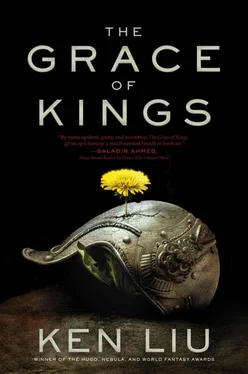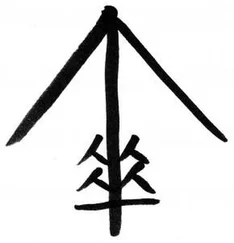And then came Réon, and everything changed.

The emperor looked around.
He was in Pan, the Immaculate City, standing in the middle of the broad expanse of Kiji Square in front of the palace. Normally the square was empty, save for children who flew kites in spring and summer and built ice statues in winter. Occasionally an Imperial airship landed in it, and nearby citizens would gather to watch.
But today the square was not empty. He was surrounded by colossal statues of the gods of Dara. The statues, each as tall as the Throne Pagoda, were made with bronze and iron and painted with bright, lifelike colors.
Long ago, Thasoluo, the World Father, was called away by the King of All Deities, Moäno, never to return. He left behind his pregnant wife, Daraméa, the Source-of-All-Waters. Alone in the void, she cried hot, large tears of lava as she gave birth. The sizzling tears fell from the heavens into the sea and solidified into the Islands of Dara.
Eight children were born. As the gods of Dara, they staked out their claims to the Islands and watched over the native inhabitants. Daraméa, comforted, withdrew to the great ocean, leaving her children in charge of Dara. Later, when the Ano arrived and spread throughout the Islands, their fates also became inextricably bound with the doings and undoings of the deities.
The emperor had long dreamed of confiscating all the weapons of Dara, all the swords and spears, all the knives and arrows, and melting them down into their constituent metals so that they could be turned into statues honoring the gods. Without weapons, there would be eternal peace in the world.
He had always been too busy to convert his grand vision into reality, yet somehow here they were. Perhaps this was a chance for him to plead his case directly to the gods, to ask for long life and good health and restored youth.
Mapidéré knelt first before Kiji, the source of Xana’s strength. The statue depicted a middle-aged man with white sideburns, a bald head, and a white cape on his back. Mapidéré admired the intricate designs on the cape, showing Kiji’s mastery over wind, flight, and birds. On Kiji’s shoulder sat his pawi , the Mingén falcon.
“Lord Kiji, are you pleased by this sign of my piety? There is yet much that I can do to glorify you, but I need more time!”
The emperor wished that the god would give him a sign that his prayer was heard. But he well knew that the gods preferred to work in obscure mystery.
Next to Kiji were the Twins, Kana and Rapa, patrons of Cocru. Kana wore a black dress and had brown skin, long silky black hair, and dark-brown eyes, while Rapa, with a face identical to her sister’s, wore a white dress and had pale skin, snow-white hair, and light-gray eyes. Over the sisters’ shoulders stood their pawi , a pair of ravens, one black, one white.
Mapidéré may have conquered all the Tiro states, but he sought the approbation of all the gods. He lowered his head to the goddesses next. “I honor you, Lady Kana, mistress of fire, ash, and death. I honor you, Lady Rapa, mistress of ice, snow, and sleep. I have taken away men’s weapons and ended their strife so that they may all turn their hearts to thoughts of you. May you see fit to grant me many more years of life.”
The statues of the goddesses shifted and came to life.
The emperor was too stunned to move or speak.
Kana turned her bronze eyes to the kneeling Mapidéré like a woman turning to gaze at an ant. Her voice was loud, harsh, discordant, recalling the scraping of rusty swords across an old sharpening stone.
“Even if Cocru lives on only in the heart of one man, it will bring about the fall of Xana.”
Mapidéré trembled.
“Do you think I will stand by and do nothing?”
Mapidéré looked back and saw that the thunderous, sonorous voice belonged to Kiji, who had also come to life. The statue took a step forward and the ground quaked beneath Mapidéré. The Mingén falcon took off from his shoulder and circled over the statues of the gods; Kana and Rapa’s ravens took off also and cried challengingly at the falcon.
“Have you forgotten our pact?” said Rapa, whose voice was mellifluous, cool, harmonious, but no less powerful than her sister’s. She and Kana were as far apart as ice and fire, yet as close as sleep and death.
“I’m not the one agitating for further bloodshed,” said Kiji. He lifted his left hand, which was missing a pinkie, placed the index and middle fingers into his mouth, and whistled. The Mingén falcon, still gazing balefully at the ravens, reluctantly returned to his shoulder. “Xana has emerged victorious. The time for war is over. Mapidéré has brought peace, however much you may dislike him.”
The statue of Fithowéo of Rima, a lean, muscular man in leather armor carrying a long spear with an obsidian tip, shifted and spoke next. “Taking away men’s weapons will not bring peace. They’ll fight with sticks and stones, and tooth and nail. Mapidéré’s is a peace supported only by fear, as secure as a nest built on a rotten branch.”
Mapidéré despaired at the words of Lord Fithowéo, the god of the hunt, of metals and stone, and war and peace. The emperor looked into the god’s eyes, the cold, dark obsidian from Mount Fithowéo, and saw no compassion. His pawi , the wolf, howled to accompany the end of his master’s rumbling speech.
Fithowéo bared his teeth at Kiji and let out a bloodcurdling war cry.
“Do not mistake my restraint for weakness,” said Kiji. “It has been eons since my falcon pecked out your eyes and you had to replace them with stones. Would you like to experience blindness again?”
“Listen to how you talk!” Kana’s discordant laughter made Kiji wince. “The last time we fought I singed off all the hair on your head and your beard so that you now have to make do with these ridiculous sideburns. I’d be happy to leave you some deeper scars—”
“—or make you lose more than just your pinkie from frostbite,” said Rapa. Her lovely, cold voice made the threat seem even more frightening.
Mapidéré fell to the ground and scrambled away on his hands and knees to the statue of Rufizo of Faça, lord of life, healing, and green pastures. He grabbed a big toe with both his arms, but the cold metal provided no comfort.
“Lord Rufizo,” Mapidéré cried out, “protect me! Stop this strife among your siblings.”
Rufizo was a tall, lanky young man wearing a cape of green ivy. His sad eyes came to life, and he shook his foot carefully, casting off Mapidéré like a dirt clod. He stepped between Kiji, Fithowéo, and the Twins and spoke in a voice as gentle and soothing as the pools fed by Rufizo Falls, whose water was hot year round, keeping nearby pastures green despite the cold climate of the Faça Highlands.
“Enough of this posturing, my brothers and sisters. After the Diaspora Wars, during which all of us caused our mother much grief, we vowed that the gods would never again harm one another, as Moäno is our witness. During all the years of Mapidéré’s wars, we kept peace among us. Today is not the day to break that promise.”
Mapidéré, lying on the ground, was comforted by this speech. He remembered that in the aftermath of the mythical, bloody Diaspora Wars, when the gods had accompanied ancient Ano heroes onto the battlefield, the divine siblings had vowed to never again take up arms against one another. Henceforth they would only interfere in the affairs of men indirectly, by persuasion, trickery, inspiration, or prophesy. The gods also agreed to never again directly fight against the mortals, but to work through other men.
Читать дальше













